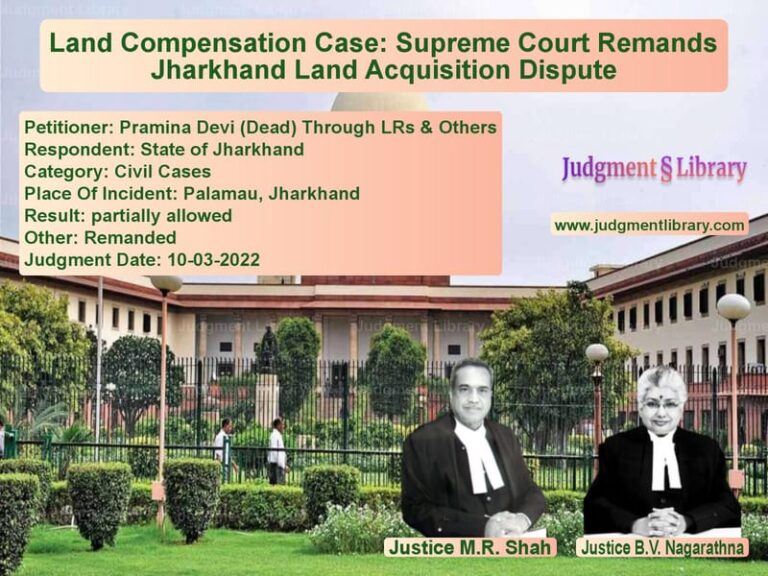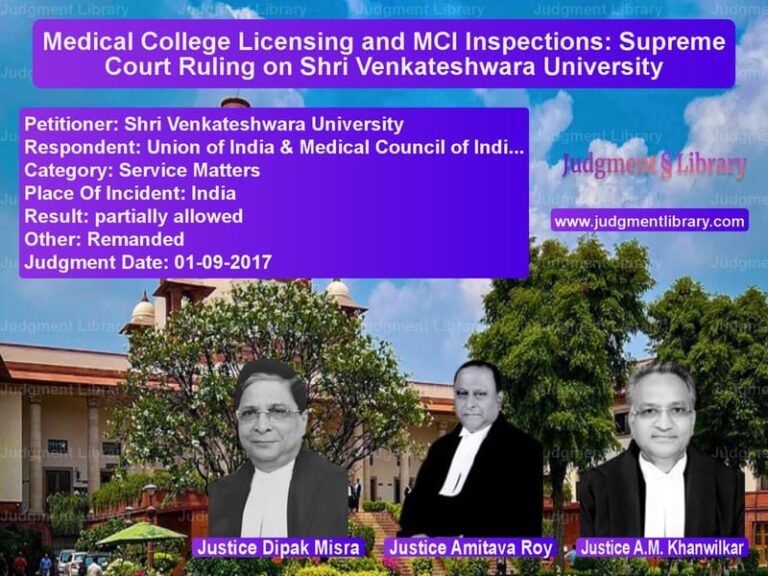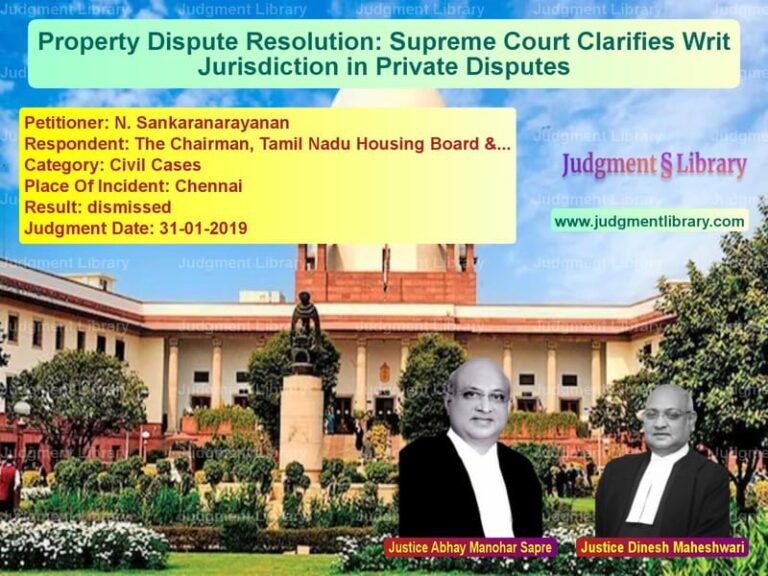Retrospective Promotion and Seniority: Supreme Court Clarifies Key Service Law Principles
The Supreme Court of India recently ruled on a crucial service law dispute in the case of Sunaina Sharma & Ors. vs. State of Jammu and Kashmir & Ors.. The judgment addressed the validity of granting retrospective promotion to promotee Excise and Taxation Officers (ETOs) in the Jammu and Kashmir Excise & Taxation Department, which resulted in altering the seniority of direct recruits.
The case primarily dealt with whether the promotee officers could be granted seniority from an earlier date based on when vacancies arose, even though they were not working in the promoted position at that time. The Supreme Court’s ruling provided clarity on the principle that seniority should be reckoned from the date of actual appointment unless specific service rules dictate otherwise.
Background of the Case
The dispute arose between two categories of officers:
- Direct Recruits: Appointed as ETOs through the Jammu & Kashmir Combined Competitive Examination and issued appointment letters on 23.07.2004.
- Promotees: Promoted to the post of ETOs after being cleared by the Public Service Commission on 05.10.2004 and formally promoted on 06.12.2004.
The issue arose when the promotees were granted retrospective promotion from various dates between 01.05.2002 and 01.01.2004, effectively placing them senior to the direct recruits despite the latter being appointed first.
Arguments of the Appellants (Direct Recruits)
The direct recruits, led by Sunaina Sharma and others, challenged the retrospective promotion granted to the promotees on the following grounds:
- The promotees were not even part of the ETO cadre when the direct recruits were appointed.
- Retrospective promotion and seniority violated service rules, as the promotees had never worked as ETOs before their formal appointment.
- Granting such promotions disrupted the legitimate seniority of the direct recruits.
Arguments of the Respondents (Promotees and State of J&K)
The promotees and the State defended the retrospective promotion, arguing:
- Under Rule 23 of the J&K Civil Service Rules, promotees could be given seniority from the date the vacancy arose in their quota.
- The service rules allowed retrospective effect for appointments if vacancies existed earlier.
- The seniority list issued on 03.01.2006 correctly placed the promotees ahead of the direct recruits.
Supreme Court’s Key Findings
The Supreme Court overturned the High Court’s decision and ruled in favor of the direct recruits. The key observations included:
“It is a settled principle of law that normally no person can be promoted with retrospective effect from a date when he was not born in the cadre. Seniority has to be reckoned only from the date the person entered into that service.”
The Court emphasized that retrospective promotions cannot be granted at the cost of another group’s legitimate seniority:
“Even if the Rules enable the State to make retrospective promotion, such promotion cannot be granted at the cost of some other group. The only reasonable interpretation can be that the promotees can get promotion from an anterior date only if they have worked against the said post even if it be on a temporary, officiating, or ad-hoc basis.”
Detailed Analysis of Service Rules
The Court examined the relevant service rules in detail, particularly Rule 23 of the J&K Civil Service Rules, which states:
“A probationer shall, if a substantive vacancy in the permanent cadre of the category for which he was selected exists, be appointed to the service at the earliest possible opportunity in order of seniority, and if such vacancy existed from a date previous to the issue of the order of appointment, he may be so appointed from the date of retrospective effect from such date or, as the case may be, from such subsequent date from which he was continuously on duty as a member of the service.”
The Court emphasized that the phrase “continuously on duty as a member of the service” implies actual service in the post. The promotees had not been working in the higher post before their formal promotion, making their retrospective promotion legally unsound.
Comparison with Previous Judicial Precedents
The Supreme Court relied on several past rulings while reaching its conclusion:
- State of Bihar vs. Akhouri Sachindra Nath (1991): The Court held that “no person can be promoted with retrospective effect from a date when he was not born in the cadre.”
- State of Uttaranchal vs. Dinesh Kr. Sharma (2007): The Court ruled that “a vacancy’s existence does not justify retrospective seniority if the individual was not appointed at that time.”
- State of Uttar Pradesh vs. Ashok Kumar Srivastava (2014): The Court reaffirmed that “seniority should be reckoned from the actual date of appointment.”
Impact of the Ruling
This judgment sets an important precedent for service law in India. The Supreme Court’s ruling ensures that:
- Retrospective promotions cannot be granted unless the employee has actually worked in the higher post.
- Seniority must be based on the date of appointment and not on when a vacancy arose.
- Future promotions and service decisions must adhere to the principle of fairness and not disrupt existing seniority structures.
Conclusion
The Supreme Court’s decision reaffirmed that retrospective seniority cannot be granted arbitrarily. By upholding the fundamental principle that seniority should be determined based on actual service, the Court has prevented unfair advantages that could undermine the integrity of public service promotions. This judgment will serve as a guiding principle for service matters in government employment.
Don’t miss out on the full details! Download the complete judgment in PDF format below and gain valuable insights instantly!
Download Judgment: Sunaina Sharma & Ors vs State of Jammu and K Supreme Court of India Judgment Dated 26-10-2017.pdf
Direct Downlaod Judgment: Direct downlaod this Judgment
See all petitions in Promotion Cases
See all petitions in Public Sector Employees
See all petitions in Recruitment Policies
See all petitions in Judgment by Madan B. Lokur
See all petitions in Judgment by Deepak Gupta
See all petitions in allowed
See all petitions in supreme court of India judgments October 2017
See all petitions in 2017 judgments
See all posts in Service Matters Category
See all allowed petitions in Service Matters Category
See all Dismissed petitions in Service Matters Category
See all partially allowed petitions in Service Matters Category







